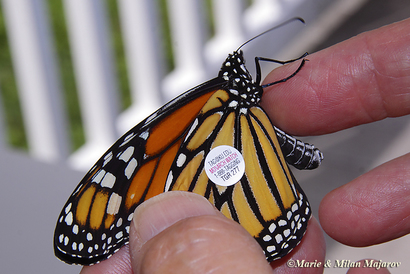 This monarch was tagged by Marie and Milan Majarov in September in Virginia. The tag was recovered in Mexico 6 months later. Photo by Marie and Milan Majarov.
This monarch was tagged by Marie and Milan Majarov in September in Virginia. The tag was recovered in Mexico 6 months later. Photo by Marie and Milan Majarov.
Marie Majarov (VMN volunteer, Shenandoah Chapter) and her husband Milan began tagging monarchs at their home in Winchester in 2006. Since then, they have tagged monarchs every year as part of the Monarch Watch citizen science project. This year, a tag from a monarch they tagged was recovered in Mexico! Monarch female tagged #TGR 277 in the Majarovs’ yard on September 9th was recovered at the El Rosario overwintering site in Mexico. “This is our first recovery…the chances for recovery of any tag are really VERY VERY low. This monarch was one we raised from a 2nd instar caterpillar found on a friend’s milkweed. To have one of our 11 tagged monarchs recovered from the population of 54 million that made it to the overwintering grounds in Mexico is INCREDIBLE!!! ” says Marie.
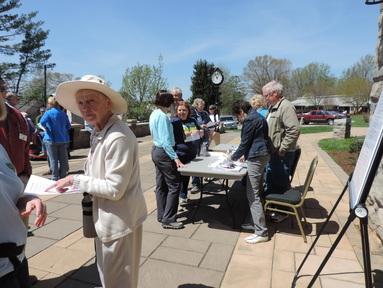 Blue Ridge Foothills and Lakes Chapter volunteers and partners share information on buffer landscaping to improve water quality.
Blue Ridge Foothills and Lakes Chapter volunteers and partners share information on buffer landscaping to improve water quality.
By Jim Pilversack (VMN volunteer – Blue Ridge Foothills and Lakes Chapter)
Blue Ridge Foothills and Lakes Chapter held a successful community education event about buffer landscaping on Sunday, April 12. With the sponsorship of partner Smith Mountain Lake Association, and collaboration with the Franklin County Master Gardeners, the Blue Ridge Soil and Water Conservation District, the Virginia Native Plant Society, the Claytor Nature Study Center, and AEP, the event drew 101 attendees from the three surrounding counties around Smith Mountain Lake.
The event – “Your Water Wise Landscape” – included speakers on Native Plants, Micro-constituent Pollutants, Turf Grass Substitutes, Rain Gardens, Backyard Wildlife Habitat, and Water Wise Landscaping. Participants also had the opportunity to tour a demonstration buffer landscape, build a bluebird house or construct a rain barrel.
Each of the collaborating organizations had a display at the conference where attendees could get additional information. Attendees also had an opportunity to sign up for a home visit from a team of Master Naturalists and Master Gardeners to brainstorm improvements they might make on their properties.
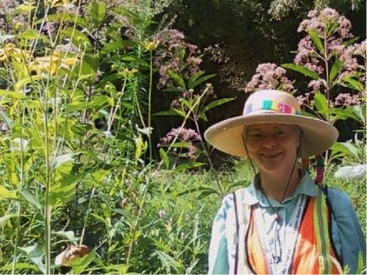 VMN volunteer Mary McLean (Arlington Regional Chapter) at Tuckahoe Park.
VMN volunteer Mary McLean (Arlington Regional Chapter) at Tuckahoe Park.
By Kasha Helget (VMN volunteer – Arlington Regional Chapter)
The Arlington Regional Master Naturalists proudly announce that on April 21, 2015, ARMN member Mary McLean was named a recipient of the Bill Thomas Outstanding Park Service Volunteer Award for her work in 2014.
McLean is a steward at Tuckahoe Park in Arlington and her specialty is invasive plants. Since the early 2000s, she has enlisted the help of neighbors, volunteer and school groups, and many others to transform the park and educate them on how to spot a non-native plant species. As a result, Tuckahoe has benefitted from a significant decline in non-native, invasive species, restored health of the native trees, and the return of native shrubs and groundcovers. In addition, McLean has also conducted focused tours and presentations on Tuckahoe Park’s underground stream and other ecological wonders to help educate and motivate others to join in the beautification effort. Plus, she has volunteered at and served professionally as the Outdoor Learning Coordinator at Tuckahoe Elementary School. In those roles, she’s worked with teachers, volunteers, and students in Tuckahoe Park on restoring habitat, planting natives, controlling erosion, and learning the natural history of the park.
McLean has been an active member of ARMN since its formation in 2008. She helped organize ARMN advanced education program, served on the ARMN Board shortly after its formation,
and also supported the ARMN Working Group on Environmental Education. She has been a long-time volunteer with stream water monitoring. Finally, McLean currently serves on the board of the Audubon Society of Northern Virginia.
A Bill Thomas volunteer award was also presented to Don Walsh, an Arlington/Alexandria Tree Steward, dedicated invasive pant removal volunteer and invaluable resource to staff and residents of Arlington County. County Board Chair Mary Hynes said, “It is people like Don and Mary who help make Arlington’s parks some of the most beautiful and well-maintained in our region. “We honor them today as outstanding examples of the incredibly dedicated volunteers who donate countless hours to nurture our green spaces and tree canopy as viable habitats for our local wildlife and tranquil oases for our busy, densely populated community.”
The Bill Thomas Outstanding Park Service Volunteer Award
(http://environment.arlingtonva.us/trees/support-trees/bill-thomas-outstanding-park-service-volunteer-award/) was established to pay tribute to lifelong parks volunteer Bill Thomas, and to honor and encourage those residents who demonstrate a passionate dedication and support for our dynamic programs, natural resources and public open spaces.
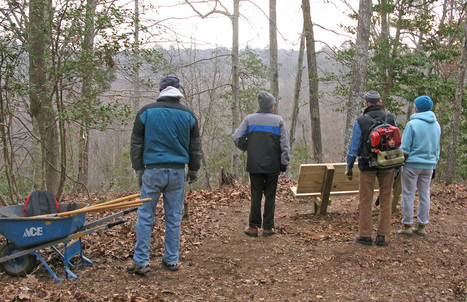 Volunteers survey the view while installing new trails at the Radcliffe Conservation Area in Chesterfield County
Volunteers survey the view while installing new trails at the Radcliffe Conservation Area in Chesterfield County
By Lesha Berkel (VMN volunteer – Pocahontas Chapter)
Members of the Pocahontas Chapter of the Virginia Master Naturalists recently teamed with the Chesterfield County Department of Parks and Recreation to construct nearly 6,600 feet of new trail within the John J. Radcliffe Conservation Area. The trail traverses a variety of terrain including marshlands, swamp, and forested uplands while providing beautiful views of a sprawling wetland bordering the Appomattox River. Beavers, deer, and waterfowl are prevalent in the area. The Department of Parks and Recreation plans to add additional boardwalks and bridges over some of the streams and other low lying ground along the trail in the coming months.
During a series of public input meetings held last year, Chesterfield County solicited input on future parks and other recreational facilities and the type of amenities the citizens of Chesterfield County wanted to see in their parks. Access to more trails was a consistent theme heard at all of the public meetings. The construction of this new section of trail at the Radcliffe Conservation Area is a first step in responding to that demand. The Department of Parks and Recreation plans to continue opening new sections of trail and adding additional recreation facilities to satisfy the desires expressed in the public input meetings.
As part of this weeklong effort, 20 VMN volunteers contributed more than 96 hours to help blaze the new trail. Not only was there great enthusiasm for the project, but the work also was meaningful to VMNs who grew up in the area.
“It is a beautiful trail with varying elevations, great streams, wonderful marsh views and much potential,” commented Bert Browning. “I remember being in this area before the Brasfield dam was built. My father was on the Chesterfield Board of Supervisors (Matoaca District) at the time of its design and construction, and I walked through the woods with him to the river where markers showed where the dam was to be placed. This was back in the 1960s when I was growing up in the Ettrick/Matoaca area.”
The new trail project in this area is an excellent example of how Virginia Master Naturalists work to benefit environmental education and conservation projects in their communities. We are proud to be a partner, and look forward to continued opportunities to assist Chesterfield’s Department of Parks and Recreation as the work continues on this trail and as the department moves forward on plans to create or enhance more trails in the county.
Located just below the Brasfield Dam and Appomattox River Water Authority, the John J. Radcliffe Conservation Area, which consists of 87 acres of woodlands and swampland along the Appomattox River, provides a unique recreational experience to the recreating public. The property includes the Appomattox River Canoe Launch which provides a parking area and boat slide for small non-powered craft.
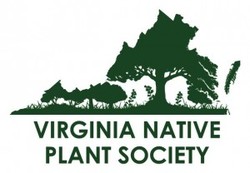
The Virginia Master Naturalist program has received a grant from the Virginia Native Plant Society to get Master Naturalist volunteers involved in monitoring occurrences of rare plants in Virginia. We are working in partnership with the Virginia Department of Conservation and Recreation Natural Heritage division to provide training for this project at our regional conferences in August and September. In addition to the rare plant surveys, we will also train and involve volunteers in monitoring other rare species occurrences, including birds and butterflies. Look for more information on how to get involved in the coming weeks. VDCR and VMN staff hope that this pilot project will lead to a long-term effort to engage VMN volunteers in these kinds of surveys.

